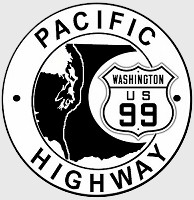
The Historic Pacific Highway
in Washington
In 1910 the Growth of Woodland Steady and Healthy Since 1882

The Historic Pacific Highway
in Washington
In 1910 the Growth of Woodland Steady and Healthy Since 1882
Growth of Woodland Steady and Healthy Since 1882
Town Now Boasts Many Business Houses is Situated in Prosperous Dairying,
Stock Raising and Fruit Raising Country and Enjoys Improved Transportation Facilities, Which Are Helping
Progress.
The Sunday Oregonian
September 25, 1910
Unlike the proverbial mushroom, the town of Woodland has not sprung up in a night, but
from its foundation has had a healthy steady growth, until today it is one of the most solid little towns in the Columbia
River Valley. In 1845 a young man named Christopher C. Bozorth crossed the plains by
ox team, with the usual hardships that beset the pioneers, settled in the Lewis
River Valley in 1850, which was at that time a wilderness, and immediately set out to make himself a home.
In 1881, he erected a small store on the site of what is now the town of Woodland, and in 1882 secured a post office, naming the town Woodland, and was appointed the first postmaster. Later, he served as Justice of the Peace and later still was sent to the Legislature for two terms. "Uncle Chris," as he is familiarly known, is still living in Woodland, with his daughter; Mrs. Samuel Conrad, in the first residence that was erected in Woodland, which is still one of the best houses in town. This residence was erected by "Uncle Chris" in 1887.
From this small beginning, Woodland has gradually grown until today it has six general merchandise stores, two drug stores, one millinery store, two blacksmith shops, three hotels, two livery stables, one furniture store, one hardware store, two pool halls, three barber shops, one restaurant, one creamery, a cannery, a jewelry store, two doctors, a dentist and a cheese factory, which is the oldest in the Northwest and whose product secured a gold medal at the Alaska Yukon Exposition last year.
The post office is now of the third class, and mails go from this point to all upper Lewis River points, there being two mall routes from here. When Woodland was first established there was no communication with the outside world except by small steamer. Later on a steamer line was put on between Portland and this point which is still in operation. In 1892, the Northern Pacific Railway built a line from Vancouver to Kalama, and up to 1907 operated a "Jerkwater" train over the line, coming down in the morning and back in the afternoon.
In 1908, the Northern Pacific finished double track from Vancouver to Kalama, and at the present time there are seven dally trains each way over this line, which makes Woodland practically a suburb of Portland, which is only 30 miles distant and is reached by train in about an hour and 10 minutes. In addition, the daily boat leaves here at 6am returning at 7pm, affording a delightful water trip.
Woodland has in addition to the business houses already mentioned, a substantial bank (the Woodland State Bank), a planing mill, and last year erected a $15,000 school building, which has a high school department. Woodland's population is about 700. The principal industries of the surrounding country are dairying, stock raising and fruit raising, the community being especially successful in the latter, and in potato farming.
Fortunes have been made in the dairying business by those who have applied themselves to their business. The surrounding country is well adapted to apple and berry culture, and there are some very fine farms devoted exclusively to these crops. The country around here is not as well developed as the soil, climate and proximity to Portland would seem to justify, as under the old transportation arrangements it was not well situated.
Now, however, with the improved facilities in this direction, the whole country has taken on new life. Old timers have awakened partially to their opportunities and a great many newcomers have bought farms, taking up remaining homesteads and purchased railroad and school lands. Logging and saw milling are carried on extensively on the upper Lewis River, there being four or five logging camps, besides eight sawmills, in operation there now, and all the trade and traffic from these enterprises come and go through Woodland.
Woodland is situated on the west bank of the North Fork of the Lewis River, about six miles from where it empties into the Columbia, and distant about three miles from the Columbia by good road. The section offers a splendid opportunity to home seekers. Woodland is the point from which the beautiful Mount St. Helens and Trout Lake are reached, and for scenery and good fishing that section of the Lewis River valley cannot be excelled.
The lake is about 40 miles from Woodland, and St. Helens about 10 miles farther, and great numbers of outsiders and nearly everyone in the valley visits that delightful section every season, there being at times as many as 500 campers on the lake. In addition to this resort for fishing, there are numerous creeks, affording splendid fishing that empty into Lewis River, and during the Fall, Winter and early Spring the Lewis River furnishes some of the best salmon and trout fishing on the Coast, and in the bottoms between Woodland and the Columbia the sloughs are teeming with catfish, bass, croppies and other varieties of still water fish.